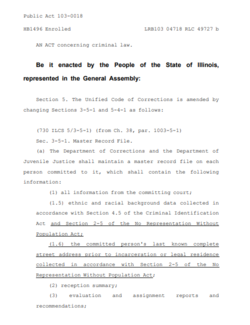Illinois strengthens its anti-prison gerrymandering law
As the Census Bureau continues to count incarcerated people in the wrong place, states like Illinois that have ended prison gerrymandering prepare for the 2030 count
June 14, 2023
On June 9th, Illinois Governor J.B. Pritzker signed into law HB1496 strengthening the state’s 2021 law that ended prison gerrymandering. Prison gerrymandering is a problem created because the Census Bureau incorrectly counts incarcerated people as residents of their prison cells rather than their home communities. As a result, when states use Census data to draw new legislative districts, they inadvertently give residents of districts with prisons greater political representation than the communities that incarcerated people call home.
This new legislation creates clearer protocols for determining last-known addresses of those incarcerated in the state by ensuring that address information collected at the local level is relayed to the Department of Corrections and providing avenues for people currently in state custody to review which address the DOC has on file for them. The legislation also expands the types of addresses allowed, to include addresses collected for post-release programs. These enhancements will make it easier for Illinois to implement its anti-prison gerrymandering reforms after the 2030 Census.
The fact remains, though, that the Census Bureau is the organization best situated to address prison gerrymandering. By simply applying its “usual residence” rule to incarcerated people in the same way it applies to other people, it could address this problem nationwide, a move states have increasingly called on the Bureau to take.
However, in the event the Bureau doesn’t address this problem before the 2030 count, states can and should take action now, like Illinois did, to ensure that they not only pass laws to end prison gerrymandering, but also that they have data-collection protocols in place that allow them to more easily count incarcerated individuals in their home communities instead of a prison cell.




